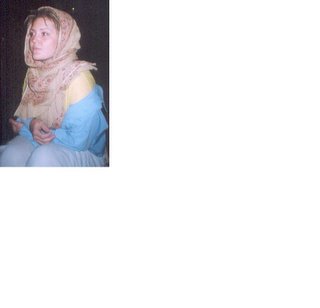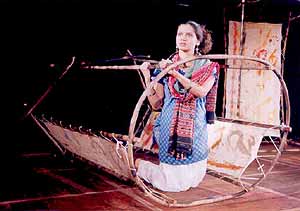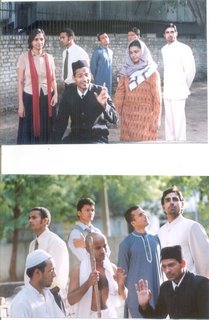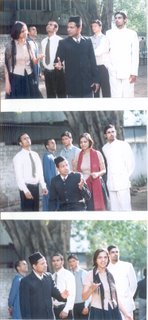
Asmita Art Group presents-
4.48 PSYCHOSIS
Solo performance by
British actress Ruth Sheard
27 th December at IHC at 7.30 pm
A Play by Sarah Kane
Directed by Arvind Gaur
"And my mind is the subject of these bewildered fragments".
4.48 Psychosis, the controversial playwright Sarah Kane's last play is a report from a region of the mind that most of us hope never to visit but from which many people cannot escape. Written whilst she herself was suffering from clinical depression, the play is as compact and beautiful as a diamond structure √ yet the mood it inspires is as black as coal.
Kane herself committed suicide shortly after finishing the play, yet surprisingly, the work is a celebration of the human impulse to create art through adversity.
Sarah Kane
(February 3, 1971- February 20, 1999) was a British playwright. Her plays dealt uncompromisingly with themes of death, sex, violence and mental illness, and are characterised by an increasing poetic intensity, a rich affirmation of love in all its forms, and by use of sharply violent imagery so powerful that it cuts across and fragments the narrative, perhaps an attempt to give us the experience of a life torn up by its roots.She struggled with intense manic depression for many years, but continued to work, and was for some time the writer-in-residence at the Royal Court theatre.
About the Actor
Ruth Sheard ,eminent British actress, gained her BA Hons Degree in Contemporary Theatre and Dance and has worked extensively in experimental theatre and contemporary art. Ruth has toured Germany with several shows including Aykbornes 'Relatively Speaking' .
Ruth is now on a theatre world tour working on several different projects.
Critics Say
The beauty and rawness-the combination of unprocessed honesty and meticulous craft- remains as striking as ever; Kane's power to take material beyond endurance and shape it, burnish it, laugh at it, dominate with her art.
-Scotsman
As compact and beautiful as a diamond in structure and yet the mood it inspires is as black as coal.
-Time Out
'Sarah Kane 'wrote simply and starkly about the world she saw around her-a mature and vividly thatrical response to the pain of living.
-The Guardian
Kane was a dramatist original enough to communicate ultimate emotions with a strange beauty as well as with a frightening bluntness.
-The Times
4.48 Psychosis is a report from a region of the mind that most of us hope never to visit but from which many people cannot escape. Those trapped there are normally rendered voiceless by their condition.
-David Greig
About the Director
Arvind Gaur who heads the Delhi, based Theatre group ASMITA is committed to innovative and socially relevant theatre. Starting off as a journalist and working for sometime for the electronic media, he set up ASMITA and earned a reputation in theatre circle in India and abroad.
Arvind Gaur has conducted many theatre workshops and performed in various Colleges, Institutions, Universities and Schools in India and abroad such as Stanford, Harvard Uni , Stony Brook Uni, Smithsonian (Washington DC),Nehru Centr (London) ,Jawahar Lal Nehru University, IILM , I.I.T.(Delhi) , AIMS , School of Planning and Arhitecture.
One of his production "Madhavi", solo by Rashi Bunny was recently invited at International Theatre Festival , Russia,oct.2005
Workshops for children in schools and slums as well as Street Theatre performances on different socio-political issues organized and conducted by Arvind Gaur are many in numberHe has also conducted theatre workshops for Actors and Directors at Houston, USA and India Habitat Centre, New Delhi. He also performed various plays in collobration with organizations like Theatre World, British Council(Chennai), IHC, Paridhi, Bahroop,Banjara Theatre group (IIT,Khargpur), IIC, Rainbow Cavaliers, M.Dot Band (Jaipur),Vivchana (Jabalpur),Darpan Academy, Prithvi Theatre Festival(platform theatre IHC,2004),and NGOs like Mobile Creches,Action-Aid, Haq, PCVC, Deepalaya , Heinrich Boll Foundation, ASF,Youthreach and World Social Forum.
He also designs lights for NAYA theatre under the Direction of Shri Habib Tanvir.
Director Arvind Gaur has also collaborated with various Theatre artists and Groups specially in exploring a new language for Solo performances which includes Dario fo's 'Story of the Tiger', solo by Jaimini Kumar Srivastava, 'Women in Black' by Bubbles Sabharwal and "Untitled Solo" by Lushin Dubey in collaboration with Theatre World. Not only have these plays received great audience response from important metropolis of India, "Women in black" was invited to perform in Dubai and "Untitled Solo" was performed in Chicago, Dallas, Washington DC, Boston, Rochester , San francisco, Ohio in USA and at the Edinburgh Theatre Festival last year .
"Bitter Chocolate " a new solo by Lushin was also performed at Harvard (USA) & at Nehru Centre, London and Gandhari solo by Aishveryaa Nidhi was recently performed at NIDA theatre , Sydney.
With Rashi Bunny, young actress trained in Theatre design at University of Alabama at Birmingham and Rutgers University, New Jersey, USA. Arvind Gaur Has directed three solo's .Bhishma sahani's" Madhavi ", Manjula Padmanabhan's 'Hidden Fires'and 'Walking through the Rainbow'.
Madhavi & Hidden fires has received rave reviews all over and have been invited to perform for Mahindra's OLD WORLD THEATRE FESTIVAL, Vivachana National Theatre Festival Jabalpur, Muktibodh Natyaotsav raipur, 5th National Theatre Festival Balaghat, World Social forum Mumbai and National School Of Drama (N.S.D.), Satta Festival Jaipur, Theatre Club J.N.U., PCVC, and Queen's Award Project (UK) for Communal Harmony.
Bishma Sahani's MADHAVI, Solo by Rashi Bunny and directed by Arvind Gaur, received special award for best play in experimentaion with tradition at International Solo Theatre Festival, Armenia.
ABOUT THE GROUP
ASMITA, one of the leading Hindi theatre groups in the country, stands committed to aesthetically innovative and socially relevant theatre. Since its inception in 1993, ASMITA has carved a niche for itself in the Indian theatre scene by staging plays of varied socio-political interest while not losing out mass appeal. The group takes up contemporary issues to underline the contours of our time while providing the best of entertainment.
The group has 48 productions to its credit and on an average has been performing for about 60 nights a year. All these plays have been directed by ASMITA's Resident Director Arvind Gaur. For ASMITA, theatre has a purpose of awakening the audience to contemporary issue and creating a dialogue on prevailing social problems. ASMITA performed in all major theatre festivals of India including National School of Drama, (Bharat Rang Mahotsava),Sangeet Natak Akademi, SKP,Nandikar and Vivachana Theatre Festival, Old World Theatre Festival, Muktibodh Natya Samaroh,World Social Forum and Nehru Centre Festival Mumbai
In the past 12 years, the group has performed Girish Karnad's 'Tuglaq' and 'Rakt Kalyan', Dharamveer Bharti's 'Andha Yug', Swadesh Deepak's 'Court Martial', G P Deshpande's 'Antim Divas', Albert Camus' 'Caligula', Mahesh Dattani's 'Final Solutions' and 'Tara', Eugene O'neill 's 'Desire Under the Elms', Dario Fo's 'An Accidental Death of an Anarchist', Dr.Narenda Mohan's 'Kalandar', Bertolt Brecht's 'Good Woman of Setzuan' and 'Caucasian Chalk Circle', Samuel Beckett's 'Waiting For Godot', John Octanasek's 'Romeo Juliet and the Darkness', Neil Simon's 'The Good Doctor', Vijay Tendulkar's 'Ghasiram Kotwal', Munshi Premchand's 'Moteram ka Satyagrah', Ashok Lal's 'Ek Mamooli Aadmi', Rajesh Kumar's 'Me Gandhi Bolto', Vijay Mishra's 'Tatt Niranjana', Doodnath Singh's 'Yama Gatha', Uday Prakash's 'Warren Hastings ka Saand',
Bhishma Sahani's 'Madhavi' & Manjula Padmanbhan's 'Hidden Fires'(both solo by actress Rashi Bunny), Walking Through the Rainbow ( joint production with PCVC, solo by Rashi Bunny) & Gandhari ( solo by Aishveryaa Nidhi).
Contact-
arvindgaur@hotmail.com,
arvindasmita@yahoo.com
09899650509,
09810606823





